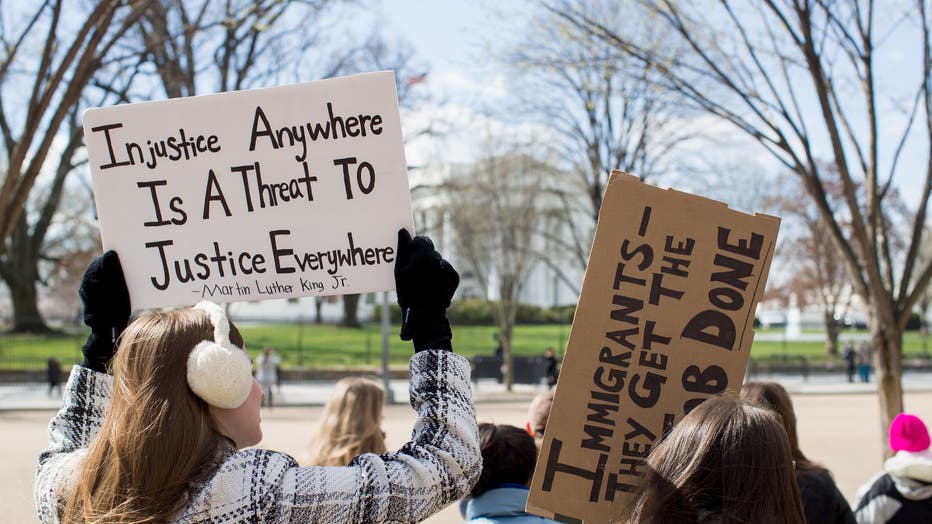6 more states just sued President Donald Trump over his travel ban


Demonstrators gather near The White House to protest President Donald Trump's travel ban on six Muslim countries on March (TASOS KATOPODIS/AFP/Getty Images)
By Meg Wagner
A new appeal to the judge that President Trump attacked on Twitter
Washington state has again sued President Donald Trump, asking the judge who blocked the president’s first travel ban targeting immigrants and visitors from several Muslim-majority countries to extend his restraining order to the revised order.
The new lawsuit — filed on Monday by Washington’s attorney general and joined by prosecutors representing California, Maryland, Massachusetts, New York, and Oregon — asks for U.S. District Judge James Robart to stop the new travel ban from taking effect on Thursday.
The joint suit comes just days after Hawaii levied the first legal challenge to the new order.
President Trump issued the latest rule on March 6, adding some provisions to make it harder to challenge in court than the original. But the Monday lawsuit alleges that the new provisions, like the first ones, “will cause severe and immediate harms to the States, including our residents, our colleges and universities, our healthcare providers, and our businesses.”
Robart — whom President Trump bashed on Twitter for his ruling against the first executive order — gave the government a Tuesday deadline to respond to the new lawsuit. The Justice Department has not yet commented.
The states asked that Robart hold a hearing before Thursday to hear arguments from both sides, but the judge said he would not commit to that timeline. It’s not clear when a hearing may take place.
Two orders, one goal
President Trump signed his first executive order travel ban, which was touted as an anti-terrorism measure, on Jan. 27. It blocked citizens from seven Muslim majority countries — Iran, Iraq, Libya, Syria, Somalia, Sudan, and Yemen — from entering the country for 90 days. It also shuttered the U.S.’s refugee program by banning asylum-seekers from Syria indefinitely and refugees from every other country for 120 days.
The ban, issued on a Friday afternoon, caused a weekend of chaos and confusion at the nation’s airports. Travelers from the seven newly banned countries were detained when they landed; some were green card holders, meaning that, while they hold passports from foreign countries, they had legal status to work and live in the U.S. Meanwhile, masses of protestors gathered outside many airports.
At least two dozen lawsuits were filed against that first travel ban. On Feb. 3, Robart acted on one of those suits, issuing a nationwide restraining order prohibiting federal agents from enforcing the ban. When President Trump administration challenged the judge’s decision, an appeals court refused to reinstate the ban.
The Trump administration unveiled its second executive order travel ban on March 6.
Still billed as a national security measure, the new order removed Iraq from the ban list (the White House cited the nation’s key role in helping the U.S. fight the militant group ISIS) and included a special provision to exempt green card holders from the ban. It retained the refugee ban, but did not specify that Syrians would be kept out for longer; instead, all refugees are barred from the U.S. indefinitely.
Legal experts said that the new order would be harder to challenge in court, since it ensures that legal U.S. residents won’t be affected.
A legal battle in Hawaii after a U.S. attorney purge
The new Monday lawsuit comes after an abrupt nationwide purge of U.S. attorneys — lawyers who represent the government in court — who were appointed by Barack Obama.
On Friday, the Trump administration asked the 46 U.S. attorneys appointed by the former president to resign, including Robert Capers, who served as the attorney for Eastern District of New York. Capers' office had been tasked with defending President Trump's first travel ban in a New York court — an assignment he punted down to his civil division chief.
The ousted U.S. attorneys’ deputies are now filling in as the Trump administration searches for replacements, so more junior prosecutors may continue to be the ones defending the second executive order.
While the Washington state lawsuit sits in legal limbo awaiting a responses from the government, the Hawaiian suit is progressing forward. The state sued last week, arguing that the ban harms its tourism industry, foreign students studying at Hawaiian universities, and its Muslim population.
The Justice Department responded to Hawaii’s suit on Monday, defending the ban by saying that the president has the power to "restrict or suspend entry of any class of aliens when in the national interest” and again billing it as a terrorism-fighting maneuver.
As anticipated, the Trump administration argued that since the new order specifically protects legal U.S. residents, it doesn’t have the harmful effects that Hawaii claims it does.
"The Order applies only to individuals outside the country who do not have a current visa, and even as to them, it sets forth robust waiver provisions," the Department of Justice's motion said.
A federal judge in Honolulu is set to hear arguments from both the government and the state of Hawaii on Wednesday. The judge can choose to block the executive order — like Seattle judge Robart did for the first ban — or allow it to take effect.

